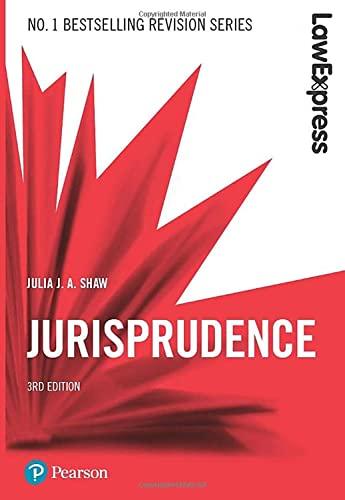Question
Question 1 Read this extract on internet contracts from Chwee Kin Keong and Others v Digilandmall.com Pte Ltd [2004] 2 SLR 594: 98 Once an
Question 1 Read this extract on internet contracts from Chwee Kin Keong and Others v Digilandmall.com Pte Ltd [2004] 2 SLR 594:
"98 Once an offer is sent over the Internet, the sender loses control over the route and delivery time of the message. In that sense, it is akin to ordinary posting. Notwithstanding some real differences with posting, it could be argued cogently that the postal rule should apply to e-mail acceptances; in other words, that the acceptance is made the instant the offer is sent. In accordance with s 15(1) of the ETA, acceptance would be effective the moment the offer enters that node of the network outside the control of the originator. There are, however, other sound reasons to argue against such a rule in favour of the recipient rule. It should be noted that while the common law jurisdictions continue to wrestle over this vexed issue, most civil law jurisdictions lean towards the recipient rule. In support of the latter it might be argued that unlike a posting, e-mail communication takes place in a relatively short time frame. The recipient rule is therefore more convenient and relevant in the context of both instantaneous or near instantaneous communications. Notwithstanding occasional failure, most e-mails arrive sooner rather than later.
99 Like the somewhat arbitrary selection of the postal rule for ordinary mail, in the ultimate analysis, a default rule should be implemented for certainty, while accepting that such a rule should be applied flexibly to minimise unjustness. In these proceedings, it appears that the purchases made by the sixth plaintiff were not accompanied by a corresponding receipt of acceptances, as his email inbox was full. Notwithstanding, the defendant does not take issue with this as the sixth plaintiff's orders were received and the appropriate automated responses generated. In light of this, the parties did not address me on the issue of when the contract was formed, though this appears to be a relevant issue depending on which rule is adopted. In the absence of proper and full arguments on the issue of which rule is to be preferred, I do not think it is appropriate for me to give any definitive views in these proceedings on this very important issue. It can be noted, however, that while s 15 of the ETA appears to be inclined in favour of the receipt rule, commentaries indicate that it is not intended to affect substantive law. It deals with the process rather than the substance of how to divine the rule."
Required
(a) In the common law tradition, the doctrine of stare decisis governs the making of case law. Define this doctrine and give your opinion on the advantages and disadvantages (if any) of this particular process of judicial development.
(b) From the above extract of Chwee Kin Keong and Others v Digilandmall.com Pte Ltd [2004] 2 SLR 594, pick out the lines or portions which would best represent what you feel is obiter dicta. Explain your choice, giving your reasons clearly.
Step by Step Solution
There are 3 Steps involved in it
Step: 1

Get Instant Access to Expert-Tailored Solutions
See step-by-step solutions with expert insights and AI powered tools for academic success
Step: 2

Step: 3

Ace Your Homework with AI
Get the answers you need in no time with our AI-driven, step-by-step assistance
Get Started


